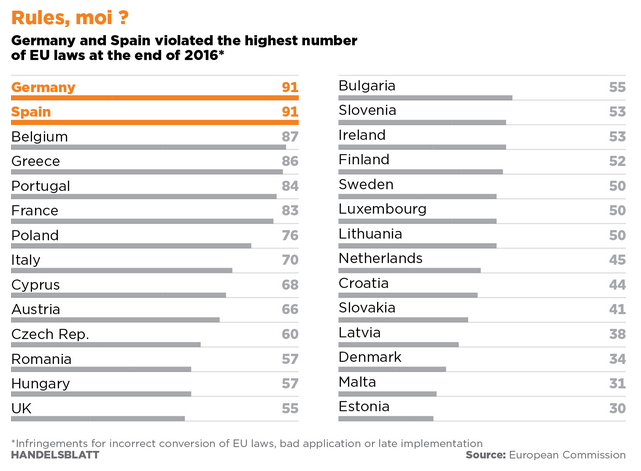Germania. 74 procedure EU di infrazione, ma nessuno ne parla.
Giuseppe Sandro Mela.
2018-02-09.

L’Unione Europea ha recentemente rilasciato tre Report:
*
«The effective application of EU law is essential to delivering the benefits of European Union policies to the public and to businesses. Often, when issues come to the fore — car emissions testing, illegal landfills or transport safety and security — it is not the lack of EU legislation that is the problem but rather that EU law is not applied effectively.
The Member States are responsible for transposing directives into their national law on time and accurately, as well as for correctly applying and implementing the entire body of EU legislation (the acquis). The Commission, as guardian of the Treaties, monitors the Member States’ measures and ensures that their legislation complies with EU law. Should a Member State fail to comply with Union law, the Commission may open an infringement procedure and, if necessary, bring the case before the Court of Justice. Financial penalties may be proposed when a Member State fails to implement a Court judgment or to communicate to the Commission its measures transposing a legislative Directive.
Better application of EU law is a priority of the Juncker Commission and a key part of the Better Regulation Agenda. The Commission restated its commitment to improving the application of EU law in a Communication of December 2016 which sets out a more strategic approach to its infringement policy. It announced that it would give priority to pursuing the most serious breaches of EU law affecting the interests of citizens and businesses.
This annual report highlights the main developments in enforcement policy in 2016. The structure of the report reflects the focus on enforcement in the political priority areas of the Commission. For example, the Commission pursued enforcement actions in the area of the internal market, where it specifically targeted Member States’ failure to establish or apply penalties systems to deter car manufacturers from violating car emissions legislation. Another example is the transposition of EU rules on public procurement and concessions; here, full transposition and implementation of EU law is essential to make it easier and cheaper for small and medium-sized enterprises to bid for public contracts, in full respect of the EU’s principles of transparency and competition. In addition to the priority areas, the documents accompanying the report examine how well EU law was applied, and the challenges faced, in each Member State and policy area.»
*
«Most EU Pilot files which led to formal infringement procedures concerned the following policy areas: environment (53 cases), internal market, industry, entrepreneurship and SMEs (38), energy (29), and taxation and customs (25). Hungary and Germany had the highest number of files in EU Pilot which were pursued through infringement procedures (at 18 and 14 files each respectively), followed by Spain and Poland (13 files each).»
*
«Member States frequently take the measures needed to comply with a Court judgment promptly. However, at the end of the year 95 infringement procedures were still open after a Court ruling because the Commission considered that the Member States concerned had not yet complied with judgments under Article 258 TFEU. The main Member States concerned were Greece (14), Spain (8), Germany and Italy (both 7). The cases mainly related to the environment (37), transport and mobility (13), taxation and customs (9), and the internal market (8).»
* * * * * * * *
«No other country seems to lecture EU states as much as Germany»
*
«But, embarrassingly, Angela Merkel’s government is in breach of European regulations more than anyone else»
* * *
È contraddittorio rimproverare agli altri ciò che si fa. È talmente evidente che deve prenderne atto anche il giornale della confindustria tedesca.
Adesso staremo a vedere come Frau Merkel, sempre che diventi Cancelliera, abbia il coraggio di rivedere le bucce agli altri paesi dell’Unione.
No other country seems to lecture EU states as much as Germany. But, embarrassingly, Angela Merkel’s government is in breach of European regulations more than anyone else.
*
Yes, it’s really true: Germany is the top rule breaker in the European Union. The country, which has lectured debt sinners like Greece, performs worst in complying with European Union legislation. Physician, heal thyself.
New figures from Germany’s Economics Ministry reveal that Angela Merkel’s government currently faces no less than 74 infringement proceedings for failing to adequately and timely convert EU rules into German law. “We’re no longer the model pupil – we’re bottom of the class,” Green Party politician Markus Tressel told Handelsblatt. The Green Party requested the numbers from the ministry.
The latest available EU-wide data, which uses figures from the end of 2016, already shows Germany topping the list of violators, together with Spain. And though the ministry’s new figures show a decrease, it’s still 20-percent higher than in 2012. “The government performs badly in converting EU directives into national law, especially in the areas of traffic and environment,” said Mr. Tressel.
The violations cover key issues affecting health and safety, including air pollution, traffic noise, fire protection measures and water quality, according to the ministry’s figures. Germany’s transportation ministry currently faces 20 infringement procedures, while the environment and finance ministries come in second and third.
The economics ministry pointed out that the numbers may not be as damning as they first seem. The initiation of infringement proceedings does not necessarily mean Germany is in breach of EU law. The European Court of Justice, or ECJ, has the final say on whether there has been a serious breach. Currently, the top court has only reviewed infringement procedures in 12 of the 74 cases.
Whatever the outcome, other EU nations may experience some Schadenfreude seeing the top number. Germany, after all, has a reputation as a rule-abiding nation, where procedures and diligence can take precedence over flexibility and innovation. When it comes to implementing new laws, the figures seem to suggest the country suffers from inertion or sloppiness.
European partners will also recall some German finger-pointing. Former finance minister Wolfgang Schäuble, for instance, was famous for insisting that Greece must clean up its finances during and after the euro debt crisis from 2010 to 2012. And German Environmental Minister Barbara Hendricks urged Belgium in 2016 to improve the safety of two Belgian nuclear reactors, located close to the German border. Since 2007 it has continuously been in breach of European current-account rules because Germany sells so many goods abroad and its trade surplus is so large — the biggest in the world in fact — compared to economic output.
To a certain degree, the new revelations are a deja-vu of 2003, when Germany was the first country to break deficit rules that apply to all 19 euro-zone countries. Frugal European countries, especially Germany, had been pushing for strict regulations to limit budget deficits and debt levels. When Germany failed to reign in its deficit in the aftermath of the dot.com bust and ensuing recession, it agreed with France the rules didn’t apply.
The new figures also show that Germany sometimes simply doesn’t bother to create the necessary corresponding laws.


Nessun commento:
Posta un commento